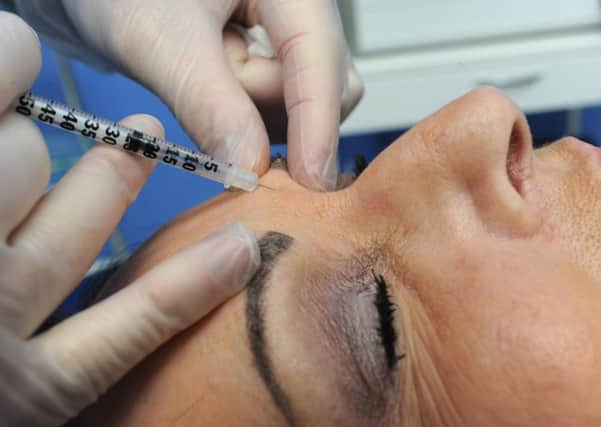Observations with Richard Beecham: A needle in the face – and other beauty tips


This was a comment not from a former trophy wife in her 50s, or a nipple-pierced divorcee dad grappling with a midlife crisis, but a friend of a friend in her late 20s.
Sensing an opportunity for humour, I aggressively stretched my facial skin back with my hands, and asked: “How do you think I’d look?”
Advertisement
Hide AdAdvertisement
Hide AdNeedless to say, my sophisticated and erudite jests were lost on the group (I blame the acoustics), and I sheepishly finished my pint, made my excuses and left the pub. But this got me thinking.
Initially, I felt angry that someone wanted to do such a thing to themselves at a relatively young age. Why become reliant on paralysing toxins to squeeze out a few more years of forehead smoothness? To what ends are people doing this? Love? Career? Friendship?
Scratch the surface and it’s not so simple.
This week, the International Society of Aesthetic Plastic Surgery released astonishing figures on the top 10 countries for cosmetic procedures.
The USA came out on top, with a total of 3,996,631 procedures (that’s one to every 78 people) taking place last year.
Advertisement
Hide AdAdvertisement
Hide AdIt would therefore be easy to merely dismiss the UK boom – procedures were up 17 percent last year – as a result of the speedy Americanisation of our culture. But when you read that Brazil tops two million, while Mexico, Germany and Spain run into the hundreds of thousands, you know that it is much more than that.
In an interview with the Daily Telegraph last year, leading plastic surgeon Dr Bryan Mendelson suggested the rise in cosmetic surgery procedures was down to more fundamental insecurities and a lack of self-esteem.
He said: “People have surgery not to impress others, they do it to impress themselves. For many people, it’s about getting their confidence back.
“But the vast majority of people who undergo surgery have something subtle done. They don’t want to tell people as they don’t want to be treated differently. It’s like make-up, they don’t want people to notice what they’ve had done.
Advertisement
Hide AdAdvertisement
Hide Ad“They’re doing it purely for themselves and their own self-esteem.”
Which begs the question: is it modern life that pushes people towards disliking themselves, or have the insecurities always been there? Would our great-grandparents have had cosmetic surgery if it had been as affordable and effective?
If it is a modern phenomenon, then it must be asked where the insecurity comes from. Is it really the fault of media portrayals of an unrealistic idea of beauty?
A paper by psychologists Striegel-Moore and Franko in 2002 referred to peoples’ dissatisfactions with their bodies as “normative discontent”. It was suggested people, in particular females, were all dissatisfied with their body image to a greater or lesser extent and, predictably, this often rooted in childhood experiences.
Advertisement
Hide AdAdvertisement
Hide AdThe one thing that stands out is that there is a consensus that the very reason for such procedures stems from a dissatisfaction of one’s appearance.
In his interview with the Telegraph, Dr Mendelson added that most of the women who have the procedure don’t consult loved ones – as they prefer for it not to be noticed.
They are, quite literally, doing it to please themselves.
I am in no way sneerful at self insecurities, everyone has them, and they all affect our lives in different ways. Overcoming them – whichever way you can – will help you to combat paralysing obstacles which stop you being happy. These procedures may well help people in such a way.
But if you find you’re left with a forehead full of poison and a wallet full of nothing, one must wonder whether it was worth it.